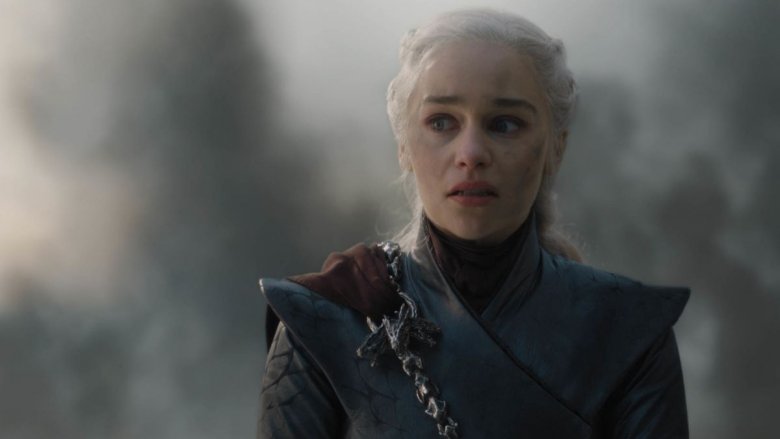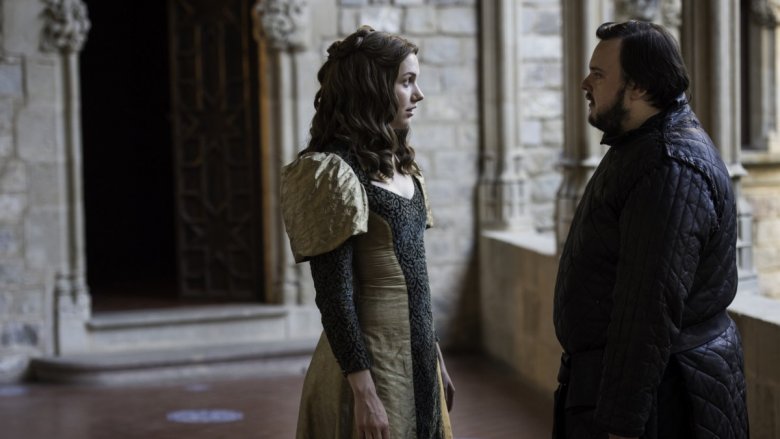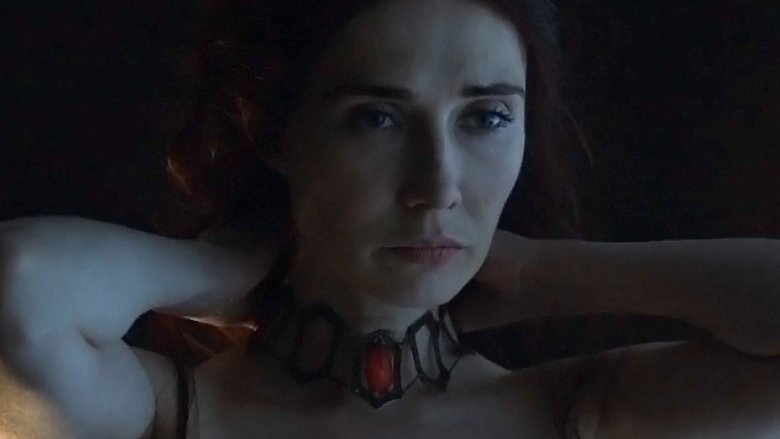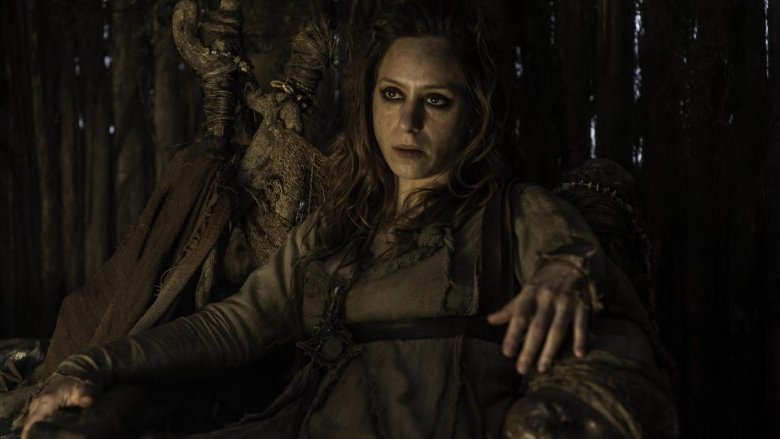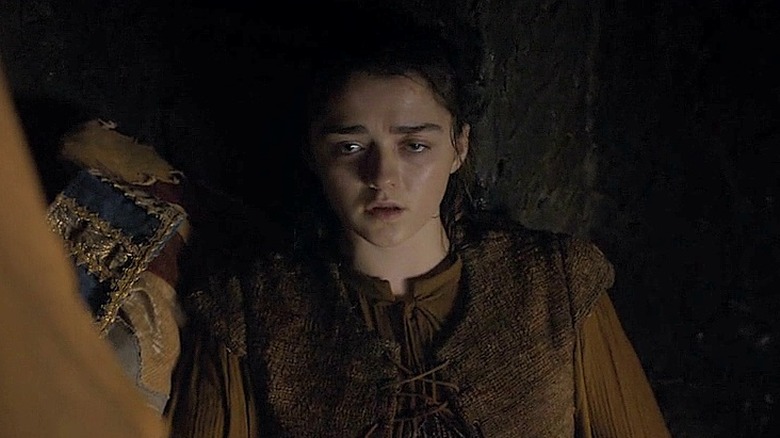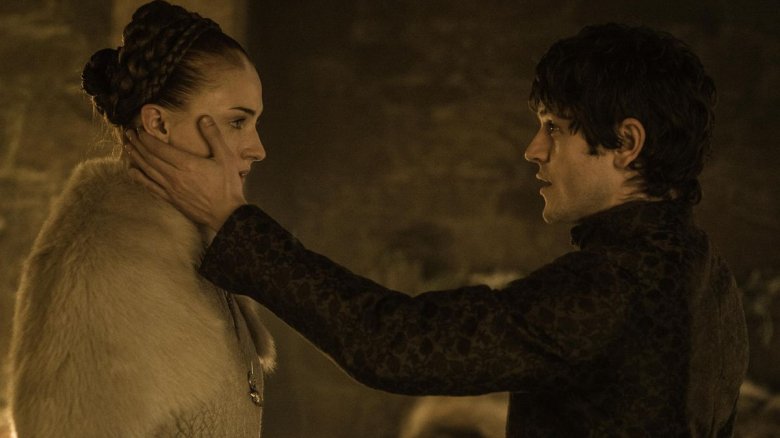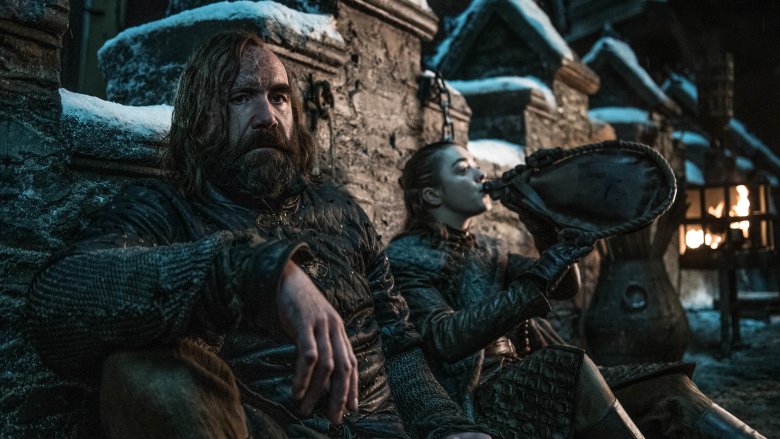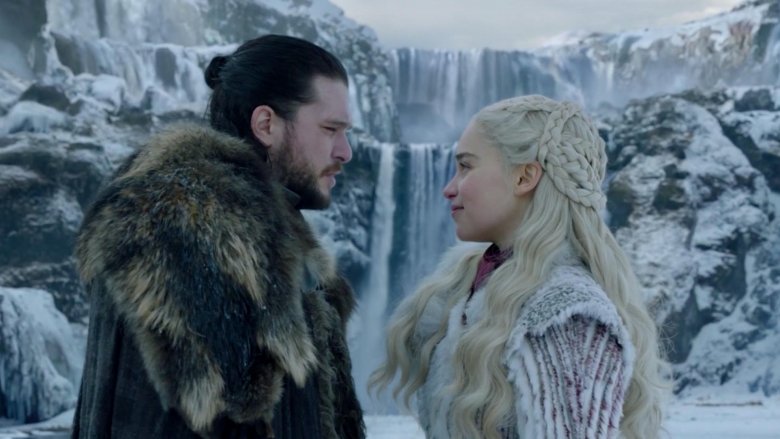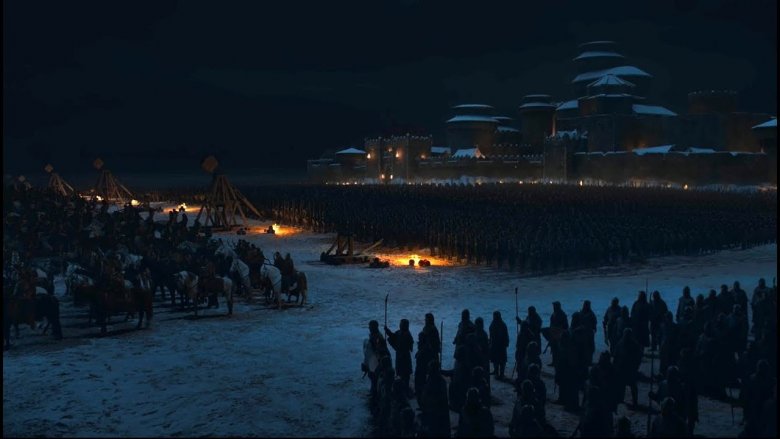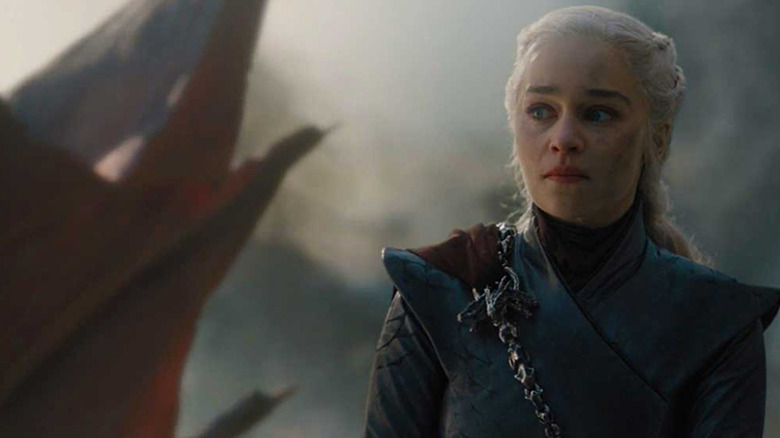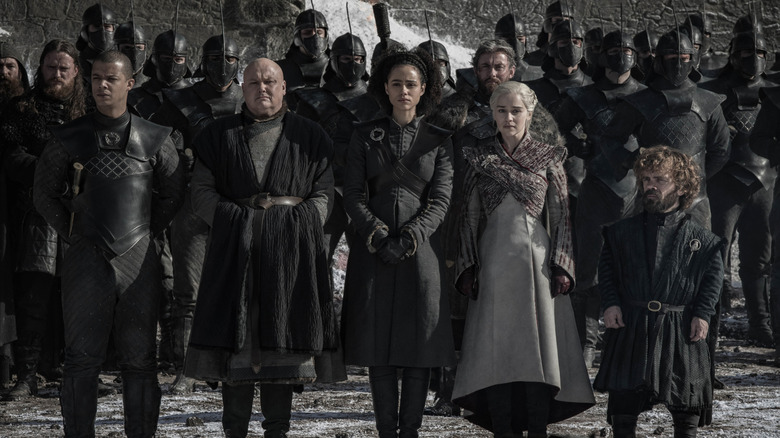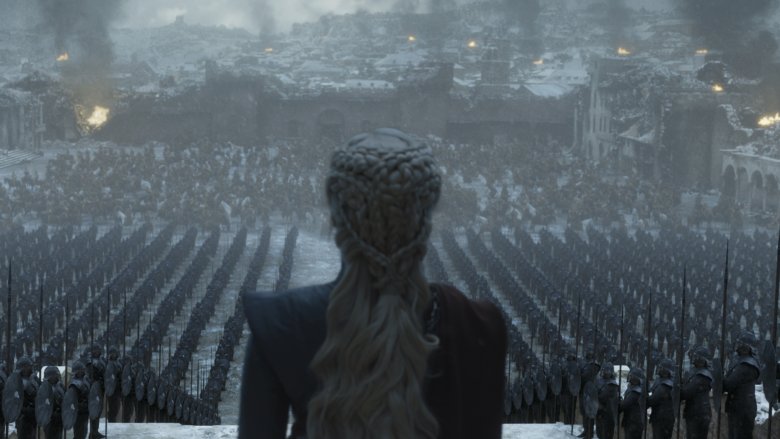The Worst Game Of Thrones Episodes According To IMDb
It's a post-Game of Thrones world we live in, one where there are no Lannister plots left to uncover, no chains for Daenerys to break, and no winters to be warned of. Sure, there are the books, but who knows when they'll be finished — and even so, the show became a saga unto itself and a work of art all its own. A massive cultural landmark has taken its final bow, and now the fans must mull the story over.
How will history regard this juggernaut of entertainment? It's not yet clear. There has, however, emerged a tentative consensus as to what the worst episodes of the series are. Most, to the surprise of no one who's been following the heated conversation surrounding the show's final year, are from the eighth season. But their order might surprise you — as well as the entries from earlier in the show's run that join them on fans' least-favorite lists. Here are the absolute worst episodes of Game of Thrones, according to IMDb. One thing they make clear? No one is neutral when it comes to Daenerys' ending.
Blood of My Blood
Game of Thrones' sixth season was a complicated one. On one hand, it delivered massively on the potential of certain storylines. Bran lost the protection of the Three-Eyed Raven, Summer, the Children of the Forest, and even dear, devoted Hodor, forcing him to assume the role his psychic dreams had been preparing him for. Daenerys broke free from the hopeless tangle of Meereenese politics in true Targaryen fashion: She escaped on a dragon, burned down a building full of men seeking to control her, and emerged unscathed, to the awed stares of thousands. Arya realized she didn't actually want to throw away her life and legacy — but also that she had no problem directing her Faceless Man skills in self-interested directions.
So "Blood of my Blood" isn't terrible. It's just housekeeping, setting the characters' affairs in order after the events of "The Door" and preparing for the literally explosive season finale, "The Winds of Winter." Perhaps the most compelling sequence takes place at Horn Hill, where audiences get to see Sam Tarly take a thrilling stand against his bigoted father, steal the family's ancestral sword, and take off into the night. Unfortunately, what surrounds him is significantly less rousing. Margaery attempts to circumvent the High Sparrow's control over her fate. Arya does not kill someone she was sent to kill. Daenerys cements the Dothraki's favor. It's all good, but it's not great.
The Red Woman
If "Blood of My Blood" is dinged for its table-setting, "The Red Woman" is positively hamstrung by it. The first episode of the sixth season, it's, well, fine — but it's not much more than that. Highlights include Brienne's stirring pledge of fealty to Sansa, the girl she had spent years searching for, and Carice van Houten's melancholy performance as a disillusioned Melisandre, letting her guard, and the illusion of youth and beauty maintained by her magical necklace, fall.
But these beacons of quality entertainment are adrift in a sea of ho-hum story progression. The Night's Watch debate what to do in the wake of Jon Snow's murder and their brothers' betrayal. The audience gets a quick peek at Arya's Faceless Man training, which at this point consists mainly of begging and being beaten by the ruthless Waif. Cersei rejoices at the return of her daughter, then mourns when she learns of Myrcella's murder. The most potent moment of action comes from the Sand Snakes' brutal murder of Doran and Oberyn Martell — but the Snakes are written as so transparently and illogically bloodthirsty that they come off as silly, bordering upon stupid. They were only ever a crew of flunkies the show wasted time on, and this episode exemplifies their uselessness as driving story concerns.
The Wars to Come
Much like "The Red Woman," "The Wars to Come" struggles under the weight of opening a season. Notably, it begins with a rare flashback in which a young Cersei is confronted with a prophecy that does not foretell the glittering future she's been promised. This was a clever innovation, stranding audiences in unfamiliar and intriguing territory before being safely herded back into the known confines for Westeros under Lannister rule.
Unfortunately, what follows is fairly humdrum. Tyrion arrives in Pentos after crossing the Narrow Sea in a filthy, fouled crate. Daenerys faces the fact that her dragons are out of commission, as Drogon is missing and Rhaegal and Viserion have been confined to the catacombs beneath the Great Pyramid. The first stirrings of the Sparrows arrive in the form of Lancel, now contrite over his affair with Cersei and his hand in Robert Baratheon's death. The episode does manage to end with a bang — or, more literally, a merciful arrow shot by Jon Snow into Mance Rayder's burning body — but it comes after an eternity of largely uninspiring set-up. The title says it all, really: The wars that will make for pulse-pounding entertainment are nigh, but not yet present.
No One
Arya stars in what is likely this episode's most exciting storyline — but it is this storyline that frustrated even the most ardent fans. Finally, after a chase through the streets and the murder of unlucky actress Lady Crane, Arya slays the Waif and pins her eyeless face to the wall. Jaqen H'ghar proclaims Arya a true Faceless Man at last, but she disagrees. She is Arya Stark of Winterfell, and she has her own battles to fight.
Exciting, right? Well, sort of. Yes, it's great to see Arya finally embrace her heritage and history, but many felt her experiences in the House of Black and White were boring, ultimately pointless, and required Arya to be bizarrely protected from the consequences of her actions. Given how much cachet the show had developed by specifically making it clear that any and all characters were subject to murder, assassination, or death by boar, it felt odd to watch Arya survive devastating stabs to the gut, subsequent falls into filthy canals, and the reopening of wounds as she fled from the Waif's pursuit. It all added up to something simultaneously less than the sum of its parts and a bit too fantastical for the audience to place their faith in. Sure, this is a world with dragons, but it's also a world with dysentery. Arya's survival was simply a bridge too far.
Unbowed, Unbent, Unbroken
Some episodes fail because they reach too far. Some fail because they don't reach far enough. And some, occasionally, fall on their face from doing a little of both. "Unbowed, Unbent, Unbroken" is one such episode. On one hand, you have a morass of Dornish subterfuge, a region the series never managed to make all that interesting, a couple of middling King's Landing scenes tracking the rise of the Sparrows, yet more Faceless Man training that somehow makes shape-shifting assassins yawn-worthy, and the slow, plodding trek that was Tyrion and Jorah's journey to Meereen. None of it is execrable, but none of it thrills.
Then there are the scenes in Winterfell. Ramsay Bolton, at the peak of his cruelty, marries Sansa, gloats over his victory, then rapes her. Many viewers found this exploitative, and beyond that, simply useless as a storytelling device. We'd already seen Sansa victimized countless times, often by powerful men. We'd already learned that Ramsay was sadistic. We already understood the terrible ravages of power in a world where bloodlines make the law — and especially the havoc men within it wreak upon the women in their thrall. What did such a brutal scene prove? Nothing, beyond Game of Thrones' willingness to shock, which had been well established for years. This episode managed to be distasteful, dull, and boring — not a hat trick any show should aim for.
A Knight of the Seven Kingdoms
In many ways, "A Knight of the Seven Kingdoms" is the best episode on this list. The highest-rated installment of the much-maligned eighth season, viewers enjoyed its warm-hearted portrayal of the calm before what might have been the very last storm. Long-simmering romances came to a boil, from Jaime and Brienne's passionate embrace to Arya's night with Gendry. Sansa and Daenerys enjoyed a moment of rapprochement. It was an affirmation of all that was worth saving about humanity: our quirks, our loves, and our dedication to survival. If a group of smugglers, nobles, wildlings, and backstabbers could join together and celebrate Westeros' first female knight, couldn't they also bring back the dawn from the icy grip of the Night King?
But there were cracks in the foundation viewers couldn't ignore, made more obvious in contrast to the episode's high points. Why exactly was Sansa so determined to hate Daenerys when the aspirant queen was dedicating her entire fighting force and the only dragons to walk the earth to a cause she could have easily ignored? Why didn't the show make the Night King's hatred of the Three-Eyed Raven more present before the very end of the series, when it can only be read as a desperate writing pool's attempt to isolate the big baddie? There is no satisfying answer, and that's why even this largely decent episode fell so far in the rankings.
Winterfell
At last, by the eighth season opener, everyone had made it to Westeros. There were the assembled fleets, forces, and dragons, all ready to turn back the tide of the White Walkers, figure out what the heck was going on with Jon's parentage, and plot to take down Cersei once and for all. Tyrion, Daenerys, Jon Snow, Sansa, Brienne, Arya, and all the rest were finally in the same room! Jon rode a dragon! Jaime and Bran locked eyes for the first time since the former shoved the latter out a window! It was climactic on its own, and promised greater stories still to come.
Yet it wasn't all good. Euron Greyjoy was, frustratingly, still taking up screen time, despite the fact that he was only ever a third-rate Ramsay knockoff. Bronn was sent on a new quest to kill Jaime and Tyrion that viewers knew wouldn't be carried out. Jon and Daenerys' romance, already rushed, was forced to bear the weight of the Starks' disapproval and still attempt to come off as star-crossed and world-shaking. It was all too much with too little room, which, in retrospect, seems absurd: This was, after all, an episode that came after seven seasons of material. And yet, as "Winterfell" set the board for the final season, much of its positioning seemed arbitrary and strange. This was the beginning of an ending few found satisfying, and it showed.
The Long Night
At last, the forces of death faced the forces of life. This was the battle fated to happen by every magical portent Game of Thrones could produce, predicted by every stone-faced Night's Watchmen, and relentlessly hyped by the HBO marketing machine. As a parade of characters, headed by Jon Snow, reminded viewers for years, there was only really one war that mattered, and it had finally arrived. Death was on the doorstep, and it wasn't inclined to wait.
And then... it was over. Seven seasons of buildup were dealt with in one episode of television. This isn't to say that it wasn't exciting: Arya's fateful stab incited emotional responses around the world, and the sight of the Dothraki's flaming arakhs being swallowed up by darkness is likely to linger in watchers' minds for years. But for all the ballyhoo about apocalyptic stakes and terrifying losses, pretty much everyone who really mattered lived. Yes, losing characters like Jorah, Lyanna Mormont, and Theon was sad, but they were all characters at the end of their arcs practically wearing "TIME TO BITE IT" signs. For the war against death itself, the actual "song of ice and fire," the battle to save humanity, regardless of house or banner, it was shockingly anti-climactic. Sure, it was cool to see the Night King shatter into a thousand shards, but it could have been so much more.
The Bells
Remember when Daenerys Stormborn, breaker of chains and burner of bad guys, was a hero? It's not hard to recall, given how much time the show dedicated to showing her righting wrongs and blazing trails. Remember when she offered water to a dying man? Remember when she pelted a slaver city with the broken collars of a thousand freed men and women? Remember when she put her grand ambitions on pause to take responsibility for the changes she'd wrought in Slaver's Bay?
You probably do, but Game of Thrones sure hoped you hadn't by the time "The Bells" rolled around. They had decided to make Daenerys an unhinged mass murderer, and nothing, not even their own writing, was going to stand in their way. It's not that Dany deserved a triumphant ending, or even that she was a perfect character, but frenzied bloodlust was at stark odds with how she'd been written for seven previous seasons. Maybe if she'd underestimated her complicity with evil, as with Mirri Maz Duur, or realized too late the costs of upending a system in one fell, fiery swoop, viewers would have bought a fall from grace. But that's not what happened. Daenerys, the only character of her stature to show consistent regard for the common people, decided to roast them alive because Game of Thrones needed her to.
The Last of the Starks
Hooray, the White Walkers are dead! Humanity is saved! Everything is good again! Time, Game of Thrones decided, to get down to business: killing Cersei, watching Daenerys fall apart, and doing remarkably little with the revelation of Jon's royal parentage. Wait, viewers protested, could that seriously be the final conflict of the show? Not the literal war against death foreshadowed since 2011, but the petty grumblings of the high-born? Yes, apparently. It all came back to the same old squabbles.
This could have been interesting, and even meaningful. Perhaps, the show might have suggested, humanity's foibles are the only constant between ages, an eternal feature of our species. But it didn't ask that. No, Game of Thrones asked the viewers to think as shallowly as possible. Why exactly, one might wonder, was Daenerys losing faith in Tyrion a red flag when he had given her nothing but terrible advice for years? How could she have "forgotten" about the Iron Fleet, as was suggested in a post-episode commentary, when she was on a dragon that allowed her to see for dozens of miles around? Why were viewers meant to see Tyrion's final appeal to the endlessly monstrous Cersei as heart-wrenching instead of truly, deeply stupid? No answers came.
The Iron Throne
Game of Thrones ended much the way it began: a story about nobly-born people negotiating power. This is not a criticism in and of itself, as some of the best stories are about failure and inertia. But there needs to be anything resembling internal logic for this sort of finale to work, and that was thin on the ground in "The Iron Throne."
Certain characters, by the show's own brutal moral calculus, should have faced the consequences of their actions — but, well, they ended up being fan favorites, so Tyrion landed on his feet despite being an absolutely terrible advisor for years. Other characters, like Daenerys, were branded as ruthless despots for engaging in the sort of tactics previously accepted by the show as intense, but understandable. Any sense of balance was completely gone, to the point that Tyrion, a literal prisoner on trial, was allowed to invent a new system of government, choose a new absolute monarch, and assume one of the most important posts in the land while still in chains. What did it all matter? What was it all for? What was the show ultimately about? Is hereditary oligarchy with an elected monarch actually better than plain old hereditary monarchy? In the end, not even Game of Thrones seemed to have any answers to those crucial queries.
